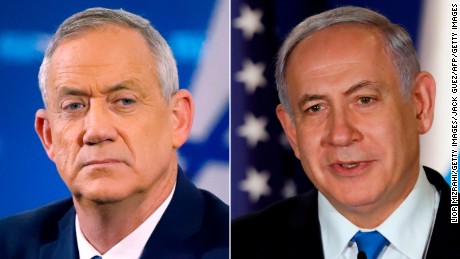Why Israel’s Arab parties made a historic move against Netanyahu

It is only the second time in Israel's history that Arab parties have given such a recommendation after an election — normally they do not signal a preference. The only other time they did so was in 1992, when they offered backing for Yitzhak Rabin, who had promised to pursue peace with the Palestinians if elected.The Arab parties stayed out of the coalition Rabin formed, but offered their support in key votes in Parliament. This time, too, the Joint List said its support for Gantz would not extend to joining him in government. Instead, it would back Gantz to stop the country's longest-serving Prime Minister, Benjamin Netanyahu, from retaking office. Writing in the New York Times, Odeh laid out his position."On behalf of the Joint List, I am recommending that Israel's president choose Benny Gantz, the leader of the centrist Blue and White party, to be the next Prime Minister. This will be the most significant step toward helping create the majority needed to prevent another term for Mr. Netanyahu. And it should be the end of his political career. My colleagues and I have made this decision not as an endorsement of Mr. Gantz and his policy proposals for the country. We are aware that Mr. Gantz has refused to commit to our legitimate political demands for a shared future, and because of that we will not join his government," he wrote.The reaction was swift and, in many cases, predictable. Netanyahu's Likud Party, which came second to Blue and White in last week's election, reprised its message from the campaign trail."As we warned, the Arab parties that oppose Israel as a Jewish and democratic state and glorify terrorists recommended Gantz for Prime Minister," Likud said in a statement. "Likud will make every effort to establish a stable and strong government committed to maintaining Israel as a Jewish and democratic state. We can't have a government that relies on Arab parties that oppose the State of Israel."Gantz himself has shown little if any interest in forming a government with the Joint List. His party said Sunday it was calling on "all Zionist parties, including Likud, to join us in establishing a broad government." Unsaid in that statement, but understood nevertheless, is Blue and White's clear wish that Likud dispense with Netanyahu as its leader before any unity government be agreed.Gantz has previously said that he will not sit with Netanyahu while the incumbent is facing possible indictment in ongoing corruption probes. Netanyahu has denied all accusations against him.It is now up to Israel's President, Reuven Rivlin, to decide who will make a first attempt to form the next government. He is due to conclude two days of meetings with delegations from all the parties Monday, after which he has a little over a week to make his decision.Complicating matters further was Monday's announcement that one of the four Arab parties that make up the Joint List was not going along with the decision to recommend Gantz. But the President's decision was never going to be straightforward. Even if he takes into account the 10 Joint List lawmakers now backing Gantz, the Blue and White leader still falls seven seats shy of the 61 endorsements required for a majority. But Netanyahu fares little better, falling six seats short. Rivlin himself has made it clear he favors a unity government but will be aware that the path to such a coalition is strewn with obstacles. Away from the parliamentary deliberations, the historic move by the Joint List has provoked admiration among many Israeli commentators.In his New York Times article, as well as demanding a return to direct negotiations aimed at achieving an independent Palestinian state, Odeh also highlighted the everyday concerns of Israel's Arab citizens, such as the need for more resources to tackle violent crime, and for equality in housing and planning laws"The only future for this country is a shared future, and there is no shared future without theRead More – Source
Away from the parliamentary deliberations, the historic move by the Joint List has provoked admiration among many Israeli commentators.In his New York Times article, as well as demanding a return to direct negotiations aimed at achieving an independent Palestinian state, Odeh also highlighted the everyday concerns of Israel's Arab citizens, such as the need for more resources to tackle violent crime, and for equality in housing and planning laws"The only future for this country is a shared future, and there is no shared future without theRead More – Source




